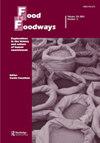有什么好吃的?波兰首都儿童食品的道德经济
IF 1.1
Q2 ANTHROPOLOGY
引用次数: 1
摘要
摘要世界上许多地方发生的围绕儿童饮食的紧张局势加剧,意味着儿童食品的道德经济正在发生变化。与食物一起,许多情绪和情感,以及判断和期望,在人们和机构之间传播。特定的食品因为被儿童食用而被视为好的或坏的。孩子和他们的母亲被认为是合适的人,因为他们吃特定的食物。本文确定了塑造波兰儿童食品道德经济的两个过程:后社会主义时期从短缺经济向富裕经济的转变,以及加入欧盟后对健康主义和健康食品的强调。这些变化塑造了对食物的制度方法和话语,以及人们的食物实践,放大了不同食物价值等级之间的情绪和紧张关系。通过个体化和反应化的过程,她们给母亲施加了特别的压力。基于2012-13年在华沙进行的民族志研究,以及2018-19年进行的回顾,这篇文章将公共辩论和大规模政治与家庭饮食方式联系起来,展示了食物的道德经济是如何通过成人和儿童的日常实践来实现的。本文章由计算机程序翻译,如有差异,请以英文原文为准。
What’s good to eat? Moral economy of children’s food in Poland’s capital
Abstract The heightened tensions around what children eat, that occur in many places of the world, signify a changing moral economy of children’s food. Together with food, many emotions and sentiments, as well as judgements and expectations, circulate among people and institutions. Particular food products become valued as good or bad because they are consumed by children. Children, and their mothers, are considered to be proper people because they eat specific food. This article identifies two processes that shaped the moral economy of children’s food in Poland: a shift from an economy of shortage to an economy of abundance during post-socialism, and an emphasis on healthism and healthy food during post-EU-accession. These changes shaped institutional approaches to and discourses on food, as well as people’s food practices, amplifying emotions around and tensions between different hierarchies of food values. And through processes of individualization and responsibilization they placed particular pressure on mothers. Based on ethnographic research conducted in Warsaw in 2012-13, and revisits conducted in 2018-19, the article connects public debates and large-scale politics to family foodways, showing how moral economy of food is enacted through adults and children’ daily practices.
求助全文
通过发布文献求助,成功后即可免费获取论文全文。
去求助
来源期刊

Food and Foodways
ANTHROPOLOGY-
CiteScore
2.20
自引率
0.00%
发文量
16
期刊介绍:
Food and Foodways is a refereed, interdisciplinary, and international journal devoted to publishing original scholarly articles on the history and culture of human nourishment. By reflecting on the role food plays in human relations, this unique journal explores the powerful but often subtle ways in which food has shaped, and shapes, our lives socially, economically, politically, mentally, nutritionally, and morally. Because food is a pervasive social phenomenon, it cannot be approached by any one discipline. We encourage articles that engage dialogue, debate, and exchange across disciplines.
 求助内容:
求助内容: 应助结果提醒方式:
应助结果提醒方式:


